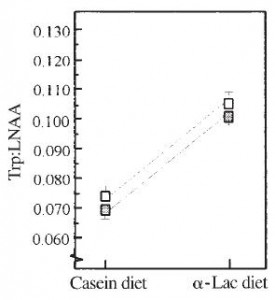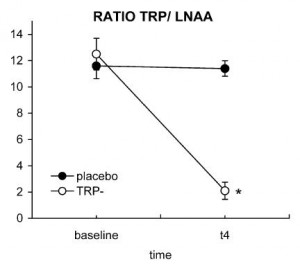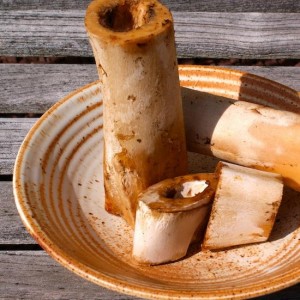Gelatin and glycine have bounced around the blogosphere for quite some time. Coming from a nutrition-centric place: you say gelatin, I think tryptophan (or lack thereof) and glycine. Others think:
Jane Plain discusses positive mental effects of gelatin and pimps Pro-Stat (good source of glycine). Chris Masterjohn discusses glycine and in typical WAP fashion seems to favor bone broth (20% off Kettle & Fire’s awesome broths HERE!). Knox gelatin
didn’t help Michael Allen Smith sleep better, and he apparently tracks sleep quality quite well. However, Sondra Rose thinks it improves sleep harmony, and gelatin simply blows Dana Carpender’s mind.
Tryptophan-rich proteins like those found in whey and egg whites will elevate blood levels of tryptophan relative to other large neutral amino acids (Trp:LNAA ratio), leading to higher brain uptake and subsequent serotonin synthesis. Tryptophan-poor proteins like gelatin do the opposite, and impair memory. But the high glycine content in gelatin improves sleep quality.* Glycine powder might be able to get around this, it’s dirt cheap and it seems to have the opposite effect on brain serotonin, albeit at a much higher dose (and in rats).
Branched-chain amino acids (BCAAs) and tryptophan use the same transporter to get into brain. Weird, I know. Carb-induced insulin secretion pushes BCAAs into muscle, clearing the way for tryptophan to enter brain; this formed the basis for one of the theories about why you might get tired after Thanksgiving dinner. During exercise, muscle uses BCAAs for fuel and this formed the basis for one of the early theories of exercise-induced fatigue.
Protein quality matters, too. Insulin-induced tryptophan shunting to brain can be attenuated with a few grams of casein or gelatin (trp-poor proteins) but not whey (trp-rich) (Yokogoshi and Wurtman, 1986). The theory that milk & cookies are a good bedtime snack might actually have merit, provided that it’s human milk, which a much higher whey:casein ratio than cow milk. Awkward.
Disclaimer: the theories about Thanksgiving, exercise, and milk & cookies all make sense, more or less, but aren’t things I’d put in a textbook… ie, they’ve probably been debunked (more or less).
alpha-lactalbumin is one of the major proteins found in the whey fractionof milk, and here’s how it impacts the Trp:LNAA ratio compared to casein (Markus 2000):

That study went on to show whey protein helps to reduce negative affect and depressive symptoms in neurotic people after they played a computer game designed to make them feel stupid… like “who can’t count backward from 300 in intervals of 17 with a bunch of whitecoats watching and taking notes.” I was asked to be one of the whitecoats in a similar study and it was horrific… kids panicked, started sweating… one even broke out in hives. #IRB2011?
Thus far, increased tryptophan seems good for mood. Decreased tryptophan, on the other hand…
Exhibit A. Evers and colleagues showed that depleting trp with gelatin had a negative impact on performance during a visual verbal learning test (2004).
Exhibit B. Evers’ results were confirmed by Sambeth, 2008. Similar intervention –> impaired long-term episodic memory and elementary spatial memory (long-term, in this case, was about 5 hours).
Further, tryptophan-depletion reduced “vigor” and cognition in depressed patients, and this could be prevented by nicotine administration (7 mg Nicoderm patch; a relatively low dose because they were non-smokers) (Knott 2013). *Perhaps tryptophan-depletion contributes to some of the beneficial or calming effects of glycine in gelatin (?)… difficult to tease apart because the tryptophan-depletion protocols usually use gelatin.
Back to the Jekyll of gelatin: 100 mg sublingual glycine improved memory and attention in one study (File et al., 2000)… abstract went on to say it in could be of benefit “when performance is impaired by jet lag, shift work, or disrupted sleep.” <– loaded words imo.
3 grams of glycine before bed improved sleep quality, which is what likely led to the reduced daytime sleepiness and improved memory performance in this study. Alternatively, 100 mg sublingual glycine improved memory in an acute scenario, so maybe glycine just makes you smarter independent from it’s effect on sleep.
Glycine supports cognition and enhances sleep quality, but the tryptophan-depleting effect of gelatin impairs learning and memory on a good day; lowers mood and increases aggression on a bad one (Young 2013). That said, I don’t discount the positive effects of gelatin or bone broth at all as they seem unanimously… positive. However, these studies seem to suggest that either:
1) glycine > gelatin; or
2) add some whey protein or tryptophan
to your Jello Jigglers.
Affiliate links: It’s 2018, join Binance and get some damn cryptoassets or download Honeyminer and get some Bitcoins for free!
Still looking for a pair of hot blue blockers? Carbonshade and TrueDark are offering 15% off with the coupon code LAGAKOS and Spectra479 is offering 15% off HERE. If you have no idea what I’m talking about, read this then this.
20% off some delish stocks and broths from Kettle and Fire HERE.
If you want the benefits of ‘shrooms but don’t like eating them, Real Mushrooms makes great extracts. 10% off with coupon code LAGAKOS. I recommend Lion’s Mane for the brain and Reishi for everything else.
Start your OWN Patreon campaign!
Join Earn.com with this link and get paid to answer questions online.

